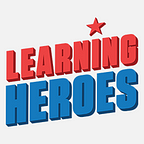Two Rivers Charter School | Young Campus
Where students, families, and educators are seen, heard, and valued
By Windy Lopez-Aflitto, Vice President of Content and Partnerships at Learning Heroes
In front of Mr. T’s 4th grade class door at Two Rivers Charter School–Young Campus you not only see student’s hopes and dreams, you see what their parents hope for them this year. Mr. T invites families to write them down so that he can better understand what they want out of the year and so that students know the adults in their lives are working together as equal partners in their child’s education. This is just one of several powerful examples at Young that demonstrate their commitment to family engagement in service of student learning and well-being.
Located in the northeast quadrant of Washington, DC, Two Rivers Public Charter Schools is a preK-3 through Grade 8 network with a diverse population of more than 900 students. The Learning Heroes team visited the school as part of our bi-annual tradition of coming together to recharge and map our strategy for the coming year. This year we spent our first day together visiting Young, a school we’ve partnered with over the past two years to customize and pilot our Parent-Teacher Planning Tool, strengthening their beginning, mid- and end-of-year Parent-Teacher conferences.
After listening to parents, teachers, school leaders and students at Young, to follow are a few reflections worth celebrating and sharing.
Families as Equal Partners
Engaging families starts before the first day of school when families are invited to meet with the teacher and share their goals for the new school year. This sets the tone for the partnership which is then followed up with regular communication such as ParentSquare and bi-weekly check-ins that focus on specific skills. One teacher shared short videos to help support parents with specific homework assignments.
“Families are part of the team. We care about connecting as human beings, not just about testing” shared Ms.Sha, Director of Special Education.
School leadership and teachers are also continuously refining their use of standards-based grading, which means that students are not graded either in comparison to each other or on how well they did on assignments, but rather on the degree to which they have mastered a given standard. Mastery is measured on 1–5 scale, with each level clearly defined on the rubric. Principal Jones shared “Parents want to know ‘Is 3 a C?’ and what does it mean if their child remains a 3 the whole school year? It doesn’t mean they haven’t progressed–it means ‘they were on grade level before and continue to be [at grade level].’” Instead of traditional As and Bs, Two Rivers’ standards-based grading enables parents and teachers to team up around very specific skills and make a plan for how to support the child at home and school.
Family engagement is also a priority of Two Rivers’ teacher leader program which shows in the school’s strong teacher retention, even amidst a teacher shortage. The AP of Instruction and AP of Culture work closely together to support teachers on how to have hard conversations with parents. And Learning Heroes’ Parent-Teacher Planning Tool is used to help guide teachers with a focus on more candid and actionable conversations during parent-teacher conferences.
Prioritizing Students, Teachers and Families Feel Heard and
Valued for Who they Are
Two Rivers has made it a priority to diversify leadership and staff to better represent its population and has an actionable commitment to equity and being an anti-racist organization. During one of our most inspiring conversations of the day, Mr. T shared “At Two Rivers, I can be who I really am and bring my best self” instead of having to be who others want him to be. “All people — and all teachers — deserve to work in a supportive environment like that.”
When asked why he invites parents to share their hopes and dreams for their children, he noted that, too often, teachers have the mindset that they hold the power. Instead, he wants to create more balance — “we need to value parents for who they are and all that they bring and can share about their children to help teachers in the classroom.”
Academics Intertwined with Social-Emotional Learning and
Real-world Issues
In addition to a project-based curriculum, students develop their own agency through 5 Scholarly Habits informed by CASEL’s SEL Framework. The scholarly habits are: I know myself. I am independent and resilient. I show compassion and embrace diversity. I can connect and collaborate. I act with integrity.
The scholarly habits come to life throughout the day–from Crew Time (their Morning Meeting), to academic goal setting, and conversations with parents about progress during informal check-ins and parent-teacher conferences. When students are struggling with something academically, teachers encourage them to identify which scholarly habit will help them overcome the challenge.
After partnering over the last two years with amazing leaders like Ms. Alison, AP of Culture, it was inspiring to see their work in action and we were honored to be the first group visiting the school since the pandemic. We ended the visit by doing a fun school tour led by two fourth graders that are on the student council. We look forward to our continued partnership supporting families and teachers to team up in support of the hopes and dreams that Two Rivers parents have for their children this year.
